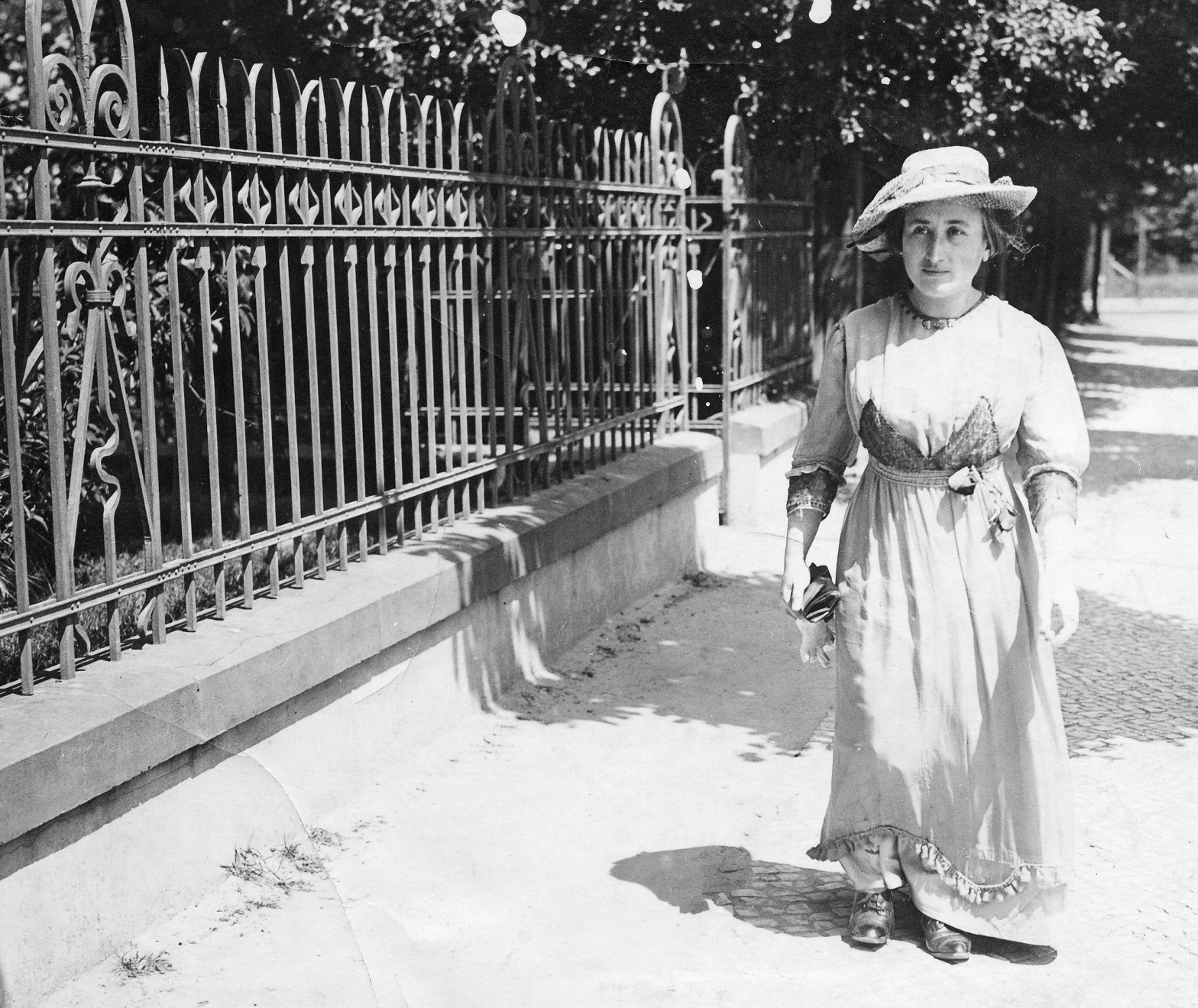Dana Mills reflects on a Polish-German Marxist’s complicated relationship with revolutionaries in Britain from Lenin to Sylvia Pankhurst
IN the spring of 1907, having just been released from a Berlin prison, Rosa Luxemburg arrived in London to attend a congress of the exiled Russian Social-Democratic Labour Party – and to debate revolutionary strategy with various Bolshevik delegates including Lenin, Trotsky and Stalin.
It was her second visit to a city – she had previously attended the Internationalist Socialist Congress in 1896 – and on this occasion she spent much of her time in the East End: the congress was held at the Brotherhood Socialist Church in Hackney. Yet it seems that neither the climate nor the culture of London was much to her liking.
Dark underground
‘I’m sitting in the middle of the famous Whitechapel district,’ she wrote to her lover Konstantin (Kostja) Zametkin on 13th May 1907. ‘In a foul mood I travelled through the endless stations of the dark Underground and emerged both depressed and lost in a strange and wild part of the city. It’s dark and dirty here. A dim streetlight is flickering and is reflected in puddles and pools. (It’s been raining the whole day.) To the left and right in the darkness the brightly coloured restaurants and bars give off an eerie glow. Groups of drunken people stagger with wild noise and shouting down the middle of the street, newspaper boys are also shouting, flower girls on the street corners, looking frightfully ugly and even depraved, screeching and squealing.’ Nevertheless Britain’s revolutionary history was part and parcel of Rosa’s life and afterlife.
The leading democratic theorist in the Marxist tradition, Luxemburg was born in 1871 to a middle-class Jewish family in the Polish town of Zamosc, then part of the Russian Empire. She was thrice oppressed: first as a citizen of empire; second as a Jew; third as a woman.
Reform or revolution?
Rosa made her dramatic entry into internationalist socialist history by responding to Engels’s pupil Eduard Bernstein. In the Second International (1889-1916), Marxists had argued that economic exploitation alone would produce an organised revolutionary movement. However, this was clearly not the case. Bernstein was a close friend of Marx’s daughter Eleanor, the foremother of socialist feminism, whom he often visited at her last home in Sydenham. He believed that while capitalism may be ameliorated by social reforms, revolution would not occur spontaneously. In 1899, Luxemburg wrote a pamphlet entitled Social Reform or Revolution in which she argued that merely improving the lives of the working class was not a substitute for revolution, which should be the goal of any socialist movement. This intervention launched her in a crucial role as a leftist dissenter within the international socialist movement. It also brought her to the attention of the SPD in Germany, the largest parliamentary socialist party in Europe in her lifetime – thus bringing her to Berlin, which remained the centre of her political activity for the rest of her life.
In London, in the aftermath of the 1905 Russian revolution, when a first but unsuccessful attempt to overthrow the tsarist state had been galvanised by mass strikes, Luxemburg engaged in a ferocious debate with Lenin. In 1906, the year before her sojourn in London, Rosa had published another pamphlet, The Mass Strike, the Political Party and the Trade Unions, in which she outlined her unwavering faith in the workers’ ability to forge a revolutionary consciousness. The pamphlet had sparked the anger of right-wing trade union officials who opposed democratisation of the German workers movement. However, Luxemburg’s letters from London display a keen interest in the efforts of British trade unionists to promote socialism within the workforce itself.
During her time in London, Luxemburg began to develop a sophisticated critique of the second volume of Marx’s Capital, which resulted in her principal book-length work, The Accumulation of Capital (1913), the only work on economics that she published in her lifetime. In it, her political analysis of the imperialism that was evident in the SPD, as well as in left-wing circles generally, merges with a critique of capitalism. Imperialism and capitalism are mutually supportive systems, she argues. Capitalism seeks non-capitalist markets in order to expand – and that is why empires expand into non-capitalistic markets. Her argument was criticised in its turn by Lenin, who felt that her compassion and engagement with non-Western countries was sentimental and ‘non-Marxist’. Yet it was exactly this broad internationalist view outlook that lent coherence to Luxemburg’s world view, whether she was right or wrong.
As soon as the London congress ended in July 1907, Luxemburg returned to Germany where her position as a left outlier became more urgent and poignant in the run-up to World War One. In 1914, the SPD backed the Imperial government over the conflict, while Luxemburg was again sentenced to imprisonment for organising anti-war demonstrations in Frankfurt. In jail, however, she continued to write and to agitate, studying the English Revolution and finding significance for contemporary Germany in the Roundheads’ overthrow of the monarchy.
Mythologising Rosa
Luxemburg welcomed the Russian Revolution of 1917, even though she was sceptical of anti-democratic moves by Lenin and the Bolsheviks. She was much more critical of the post-war German revolution in spite of the fact that it led to her release from prison. On 15th January 1919, however, she was captured in Berlin by a proto-fascist militia that later collaborated with Hitler’s rise to power. Her torture and murder, after which her dismembered body was thrown into the Landwehr Canal, shocked many of her comrades around the world, including the British suffragette Sylvia Pankhurst who wrote a poem in her memory (see Rachel Holmes’s recent biography Sylvia Pankhurst: Natural Born Rebel).
Rosa Luxemburg never wished to be mythologised. Yet she has been especially by the British left because she affected socialism here in many ways. In a 2019 letter to Labour Party members, John McDonnell, then Shadow Chancellor, quoted Luxemburg’s remark that the choice is always between socialism or barbarism. ‘History will do its work,’ she wrote in 1913. ‘See that you too do yours.’ Her message is timelier than ever.
Dana Mills’s Rosa Luxemburg is published by Reaktion Books. She is on the editorial board of The Complete Works of Rosa Luxemburg, of which Volume 5, Political Writings 3, will be published by Verso this autumn.

